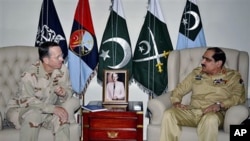The United States' top military officer, Admiral Mike Mullen, is on a visit to Afghanistan and Pakistan this week to move the war effort forward and to try and shore up the U.S. relationship with Islamabad after months of difficulty. Mullen also took the occasion to accuse Pakistani security services of helping parts of the Pakistani Taliban.
The chairman of the U.S. Joint Chiefs of Staff is in the Afghanistan/Pakistan region at a crucial time both for the war effort and for U.S.-Pakistani relations.
In Afghanistan, the spring fighting season appears to have kicked off with increased attacks by the Taliban. NATO forces are trying to hold on to gains they’ve made over the last year, since a surge of troops began - a surge that is due to draw back down starting in July.
With Pakistan being a major partner in the war effort and in the fight against extremists, Mullen is in Islamabad to coordinate counter-insurgent strategy.
But speaking to Pakistani TV, the admiral directly and publicly accused elements of the Pakistani military, or PAKMIL, as well as in Pakistan’s intelligence agency, the ISI, of supporting extremist groups, such as the Haqqani network, which has strong ties to the Pakistani Taliban.
"The ISI has a long-standing relationship with the Haqqani network," said Mullen. "That doesn't mean everybody in the ISI, but it's there. I also have an understanding that the ISI and Pakmil [Pakistan military] exist to protect their own citizens. And there's a way, there's a way that they have done that [had relations with Haqqani group] for a long period of time. I believe over time that's got to change."
That statement has angered many in Pakistan. The Head of the Army, General Ashfaq Kayani rejected the claim.
Washington also is frustrated with Pakistan because of the reluctance of the Pakistani military to attack those insurgents who slip over the border from Afghanistan into Pakistan's lawless frontier territories - away from NATO’s capacity to strike.
The U.S. often uses unmanned drones to strike those groups. And that infuriates many in Pakistan who feel the drones violate their sovereignty and often result in civilian casualties.
Also further angering many here is the CIA presence in the country - a situation brought to crisis point earlier in the year when CIA contractor Raymond Davis shot and killed two men in Lahore.
Davis claimed self-defense and later was released without trial. But the case remains an issue, as Islamabad is now demanding a reduction of CIA personnel and more oversight of agency activities - something the U.S. is reluctant to do, especially in light of the belief that some elements of the Pakistani establishment still harbor extremists.
Retired Pakistani General Talat Masood, however, said all these issues need to be put aside.
"Both countries have to admit, and stop blaming each other for their failures, because their failures are understandable, because the situation in Afghanistan and in the tribal belt is extremely complex," said Masood.
Both sides seem to recognize the relationship is essential.
"Both countries need each other so much, and they cannot afford to rupture their relationship and they have to revive it," said Masood.
With 100,000 U.S. troops fighting next door in Afghanistan, and with the continuing threat that international terrorism could find a foothold in nuclear-capable Pakistan, many here say repairing the relationship between the two countries is bound to remain high on the agenda.














